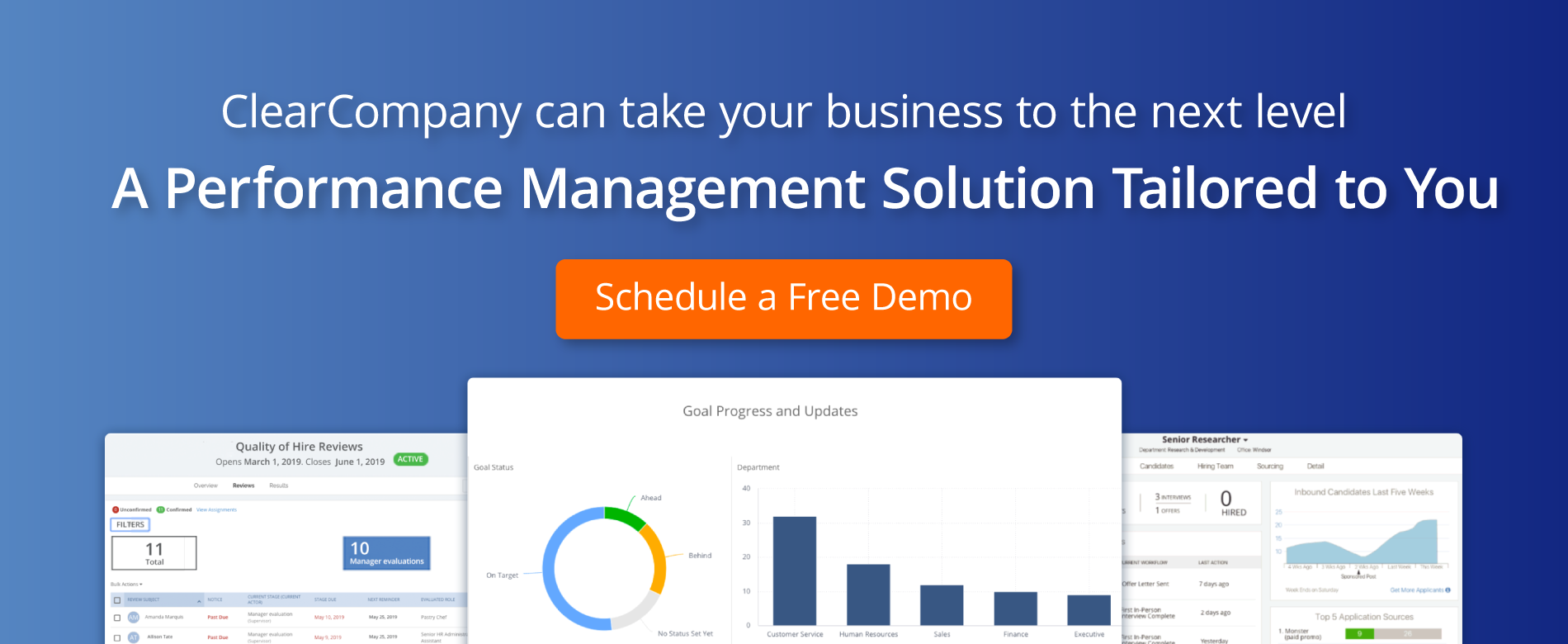Mid-year performance reviews, also called performance appraisals, are routine practices for many organizations. Conducting performance reviews is an integral part of a broader talent strategy that aims to push your employees to reach their full potential, move forward within their careers and the company, and become engaged and invested in the future of your organization.
Performance appraisals are necessary and specific conversations within your performance management process, but it’s important to understand that while performance reviews and appraisals work in tandem with performance management, these two ideas are not the same. They are distinct strategies that serve distinct purposes: Performance Management is the end-to-end process of managing talent and goals throughout the lifecycle, whereas performance reviews or appraisals are a specific way of measuring performance between scheduled conversations.
It’s an important distinction, and understanding the difference between performance management and performance appraisal is the key to a better talent strategy.
What is Performance Management?
Performance management is the strategic process HR teams use to develop overall employee performance and productivity and it is a process used to build the best team possible through a focus on the development of top talent into A Players. The goal is to foster happy, engaged employees who are capable of reaching their full potential by establishing how each role’s competencies fit into broader organizational objectives, and how to continuously improve performance over time. The better we meet the needs of individuals, the better the business performs as a whole.
Did you know? 63% of employees believe that #PerformanceReviews aren’t a good indicator of performance. @ClearCompany shows you what to do instead.Performance management is a continuous and ongoing process of growth and development. There should be a regular cycle of reviewing achievements, identifying strengths, tracking progress, monitoring and setting goals, and updating your development plan.
ClearCompany's Performance Management Software is designed to give HR professionals and managers the tools they need to seamlessly achieve goal alignment, increase employee engagement, and gain tangible insights into your workforce that you can then apply to your talent management strategy. Managers can track and monitor employee performance while highlighting and focusing on what's most important for the needs of your organization along the way.
The solution provides tools that make it easier to:
- Schedule, manage, and track performance conversations
- Provide real-time feedback — in context — that can be implemented immediately.
- Get individual, team, and organizational goals aligned
- Celebrate a job well done and get peer encouragement and socialization
- Track performance and trends across individuals, managers, and teams
What are Performance Appraisals?
Even though traditional performance appraisals can have an adverse effect on performance if done poorly, performance reviews that are well executed are a valuable tool to complement your performance management tactics. While continuous conversations can be powerful, without a scheduled time for a straightforward performance appraisal about expectations, can employees really move forward? Appraisals carve out time for structured conversations when managers can coach employees through their challenges and successes — and what lies ahead of them.
Keep in mind, however, that it’s important to know how these conversations are put together, and where the appraisal comes from. 63% of employees believe that the traditional employee-manager review is not a true indicator of performance. There may be bias, a one-sided view of the work, or maybe the person conducting the review actually has little interaction with the employee. Instead, consider a 360-Degree approach, which collects performance feedback from supervisors, cross-department collaborations, team members, and peers.
Better, more well-rounded, and objective feedback can even strengthen manager-employee relationships — giving each side the opportunity to both give and receive better feedback, and hold a more honest and open conversation where they can work together to align personal goals to company objectives.
By using the best Performance Management software, scheduling reviews and collecting feedback is easy and seamless. You can create, automate, and manage every type of performance review that’s best for you, including:
- New Hire Reviews (30, 60, 90-Day Reviews)
- Quarterly, Bi-Annual, or Annual Performance Reviews
- Competency and Roles-Based Reviews
- Time-Based Reviews
- Peer and 360 Reviews
These reviews are also customizable to your needs; you can do everything from building your own scales, questions, and sections, to creating a multi-stage process that includes review, approval, and timed stages. You can build the best review for your organization, schedule it, automate it, and collect and manage feedback — all in one place.
How Performance Management and Performance Appraisals Work Together
Performance management is the backbone of a good talent management strategy. When managers take the time to define personal goals and objectives and schedule dedicated meetings to check in with employees, it demonstrates that they care not just about performance and productivity, but about individual career aspirations and job satisfaction. It helps foster happier employees who grow into A Players and who are more likely to remain dedicated and loyal to their employer.
While performance appraisals drives the overall approach to your talent strategy, performance appraisals are a personalized conversation to ensure feedback is received, goals are met, and expectations are laid out. Performance reviews are the direct line to individuals that explicitly communicate performance.
Think of performance management as a large portrait, and the performance appraisals as tiny brush strokes. The picture works together because the artist put time into each stroke. Your business is a reflection of the time you spent on the tiny details.
Performance Management vs. Performance Appraisals: The Impact on Company Performance
Your organization’s success depends on that of your employees. Performance management and performance appraisals are both built to align individual performance and goals to those of the greater organization, and each is a critical tool to achieve the level of productivity, job satisfaction, and effectiveness required to reach your business goals. As part of your larger talent strategy, these tactics provide the space to work on employee engagement, develop the necessary skill set for success in a role, and increase overall job satisfaction. It should never be a question of performance management vs performance appraisals, but rather, which performance review technique is currently needed: performance management OR a performance appraisal?
Performance management drives the overall approach to your talent strategy: What do you need your individuals and teams to accomplish in order to meet your business goals? How do you ensure you provide the right resources, training, and development to get there? What is it that motivates employees, and how do you tap into that? How does your culture affect performance? All of these questions are broader concepts that inform how your employee performance strategy can achieve the goals you aim for.
Performance reviews — those little brush strokes on the painting — are the detailed, individualized, and personalized conversations that you have with employees to ensure that their needs are met, they are receiving the feedback, direction, and attention they need, and that they are engaged and satisfied with their work. Performance reviews are the direct line of your talent strategy: Is what you’re doing working? Do your expectations align with reality? Are your employees happy and growing? Reviews are a critical lifeline to understanding whether or not your execution will lead to your goals being met.
By effectively conducting performance reviews through your talent strategy, and focusing on each individual employee and their contribution to the achievement of company goals, it will drive your business to success. The ClearCompany Performance Management software has all the tools you need to develop A Players. To learn more, reach out to our experts to schedule a free demo today.


.png)



